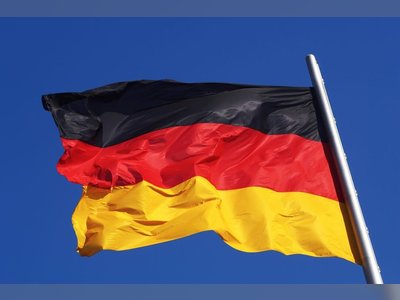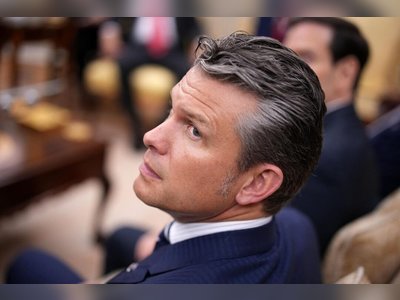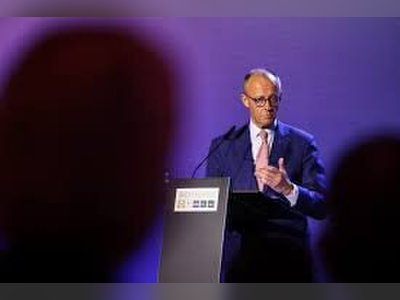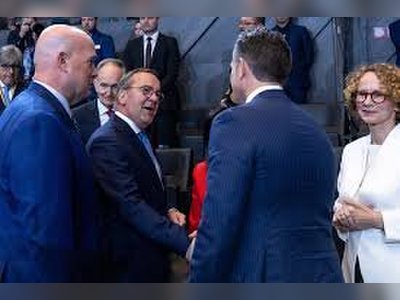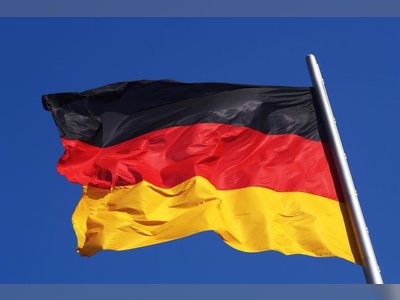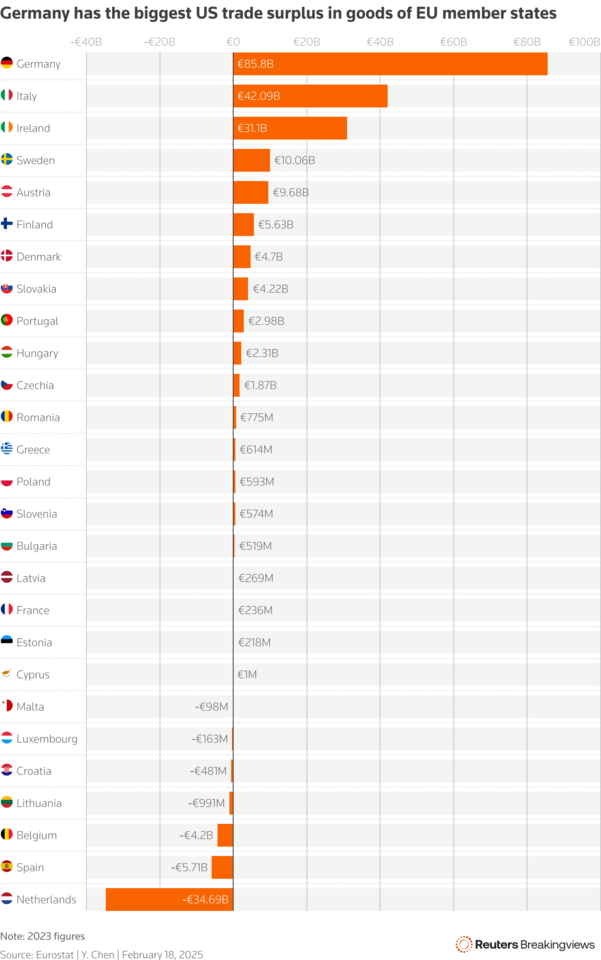
Germany's Leaders Respond to U.S. Tariff Measures with Calls for Unity
Economic Minister stresses the need for a coordinated European response as new tariffs raise concerns about the impact on Germany’s economy.
Berlin – German political leaders are advocating for a unified and determined approach in response to recently imposed tariffs by U.S. President Donald Trump, seen as a direct challenge to the European economy.
Economy Minister Robert Habeck described the tariffs as 'tariff mania' and highlighted the necessity of a cohesive European response to U.S. trade actions.
He emphasized that the strategy should prevent a tariff or trade war.
The recent designation of the European Union as the lowest category of U.S. trade partners has resulted in new tariffs of 20 percent on all EU imports, raising significant concerns in Germany, a country highly dependent on exports.
Jörg Krämer, chief economist at Commerzbank, forecasts that these tariffs could negatively impact Germany's gross domestic product (GDP) by approximately half a percent over the next two years.
The situation presents a considerable challenge for the incoming conservative Chancellor Friedrich Merz, who is a proponent of free trade and aims to stimulate Germany’s stagnant economy.
Despite tensions, conservative factions express optimism that a coordinated EU response could open pathways to negotiations with the Trump administration and potentially lead to a comprehensive free-trade agreement.
Jürgen Hardt, a senior conservative lawmaker, emphasized the need for countermeasures against U.S. tariffs to encourage negotiations, while also cautioning against an escalation that might further damage the German industrial base.
He reiterated Europe’s readiness to collaborate with the U.S. on addressing perceived injustices within the global trading system and on reforming the World Trade Organization (WTO).
Discussions among conservatives and members of the Social Democratic Party (SPD) are underway, reflecting a common goal to pursue a free-trade agreement with the United States in the medium term.
A leaked draft coalition agreement indicates an intention by both parties to respond to the tariffs in three phases: starting with retaliatory tariffs, followed by negotiations aimed at reducing tariffs on industrial goods.
Alexander Schweitzer, a state premier from the SPD and a leading economic policy negotiator, expressed hopes for a pathway back to trade discussions through this strategy of counter-tariffs.
He emphasized the need to move beyond customs-focused perspectives toward more collaborative international trade solutions.
Reviving negotiations successfully will require support from a coalition in Brussels to enhance bargaining power with the U.S. Despite Chancellor Merz's close relationship with French President Emmanuel Macron and their collaborative efforts to fortify the Franco-German alliance, disagreements over various trade issues have continued.
This situation follows the collapse of the Transatlantic Trade and Investment Partnership (TTIP) after three years of negotiations that faced internal opposition notably from some SPD members.
Hildegard Müller, president of Germany’s automotive association, has urged the European Commission to broaden its perspective on global trade agreements, advocating for expedited negotiations with various regions to reach tangible results.
In 2024, the United States remained Germany's largest trading partner, with exports amounting to €161.4 billion.
Analysts predict that the newly imposed tariffs will adversely impact critical sectors of the German economy, including automotive, pharmaceuticals, and mechanical engineering.
Economy Minister Robert Habeck described the tariffs as 'tariff mania' and highlighted the necessity of a cohesive European response to U.S. trade actions.
He emphasized that the strategy should prevent a tariff or trade war.
The recent designation of the European Union as the lowest category of U.S. trade partners has resulted in new tariffs of 20 percent on all EU imports, raising significant concerns in Germany, a country highly dependent on exports.
Jörg Krämer, chief economist at Commerzbank, forecasts that these tariffs could negatively impact Germany's gross domestic product (GDP) by approximately half a percent over the next two years.
The situation presents a considerable challenge for the incoming conservative Chancellor Friedrich Merz, who is a proponent of free trade and aims to stimulate Germany’s stagnant economy.
Despite tensions, conservative factions express optimism that a coordinated EU response could open pathways to negotiations with the Trump administration and potentially lead to a comprehensive free-trade agreement.
Jürgen Hardt, a senior conservative lawmaker, emphasized the need for countermeasures against U.S. tariffs to encourage negotiations, while also cautioning against an escalation that might further damage the German industrial base.
He reiterated Europe’s readiness to collaborate with the U.S. on addressing perceived injustices within the global trading system and on reforming the World Trade Organization (WTO).
Discussions among conservatives and members of the Social Democratic Party (SPD) are underway, reflecting a common goal to pursue a free-trade agreement with the United States in the medium term.
A leaked draft coalition agreement indicates an intention by both parties to respond to the tariffs in three phases: starting with retaliatory tariffs, followed by negotiations aimed at reducing tariffs on industrial goods.
Alexander Schweitzer, a state premier from the SPD and a leading economic policy negotiator, expressed hopes for a pathway back to trade discussions through this strategy of counter-tariffs.
He emphasized the need to move beyond customs-focused perspectives toward more collaborative international trade solutions.
Reviving negotiations successfully will require support from a coalition in Brussels to enhance bargaining power with the U.S. Despite Chancellor Merz's close relationship with French President Emmanuel Macron and their collaborative efforts to fortify the Franco-German alliance, disagreements over various trade issues have continued.
This situation follows the collapse of the Transatlantic Trade and Investment Partnership (TTIP) after three years of negotiations that faced internal opposition notably from some SPD members.
Hildegard Müller, president of Germany’s automotive association, has urged the European Commission to broaden its perspective on global trade agreements, advocating for expedited negotiations with various regions to reach tangible results.
In 2024, the United States remained Germany's largest trading partner, with exports amounting to €161.4 billion.
Analysts predict that the newly imposed tariffs will adversely impact critical sectors of the German economy, including automotive, pharmaceuticals, and mechanical engineering.
AI Disclaimer: An advanced artificial intelligence (AI) system generated the content of this page on its own. This innovative technology conducts extensive research from a variety of reliable sources, performs rigorous fact-checking and verification, cleans up and balances biased or manipulated content, and presents a minimal factual summary that is just enough yet essential for you to function as an informed and educated citizen. Please keep in mind, however, that this system is an evolving technology, and as a result, the article may contain accidental inaccuracies or errors. We urge you to help us improve our site by reporting any inaccuracies you find using the "Contact Us" link at the bottom of this page. Your helpful feedback helps us improve our system and deliver more precise content. When you find an article of interest here, please look for the full and extensive coverage of this topic in traditional news sources, as they are written by professional journalists that we try to support, not replace. We appreciate your understanding and assistance.


